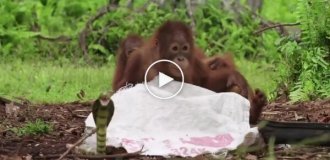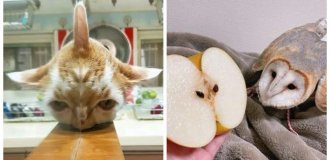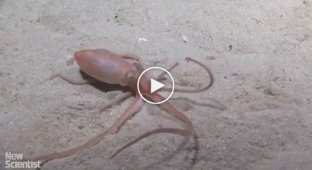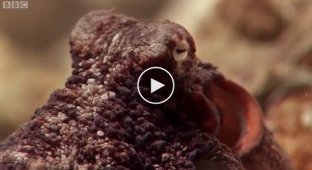When you're in a bad mood. Octopuses beat fish just like that
A group of Portuguese researchers, while observing octopuses of the species Octopus cyanea, discovered that while hunting with some fish, they beat them with their tentacles.
At the same time, sometimes the octopuses did it seemingly for no reason.
Scientists from the University of Lisbon, led by Eduardo Sampaio, discovered the unusual behavior of octopuses during a series of observations in 2018 and 2019. In a publication in the scientific publication Ecology, they describe how they studied the cooperation of octopuses and other fish during hunting - the animals often search for prey together because it is easier.
From time to time, Sampaio and his colleagues observed how octopuses with their tentacles suddenly hit the fish that surrounded them. Sometimes they showed them the way to the prey, but in some cases it seemed that the act of “beating” was just happening, as if the octopuses were doing it out of boredom.
Eventually, Portuguese scholars concluded that such "random beatings" occurred in several different contexts. Firstly, the octopus can thus “inflate the price” of the food that the fish caught during a joint hunt - for example, if the fish did not share the food.
Another theoretically possible option is “aggression with delayed gain.” In other words, the octopus “punishes” the fish because, in its opinion, it did not cooperate enough with it in the search for food.
“Octopuses and fish are known to hunt together, taking advantage of each other's morphology and hunting strategies. When there are many participants in such cooperation, a complex network is formed, where the investment of effort and the resulting benefits can be distributed unevenly, which is why a mechanism for controlling partners [in hunting] arises,” explains Sampaio’s discovery.
Now Portuguese researchers want to analyze the data collected during observations to confirm or refute their assumptions about the unusual behavior of octopuses.
Scientists have even provided video evidence of octopuses randomly kicking fish, perhaps for no reason other than spite.
In fact, this antisocial phenomenon, which scientists call "active crowding out" of fish, occurs in the midst of cooperative hunting, when octopuses and fish team up to pursue and catch prey together.
Temporary hunting alliances between octopuses and fish have been documented for decades and have included participants from different species. Sometimes the fish and octopuses work together for more than an hour, with different species exploring different areas.
Octopuses are most likely to stalk prey that dart around rocks and in tight spots on coral reefs, while bottom-feeding fish such as golden mullet (Parupeneus cyclostomus) prowl the seafloor. At this time, other species of fish may patrol the water column.























